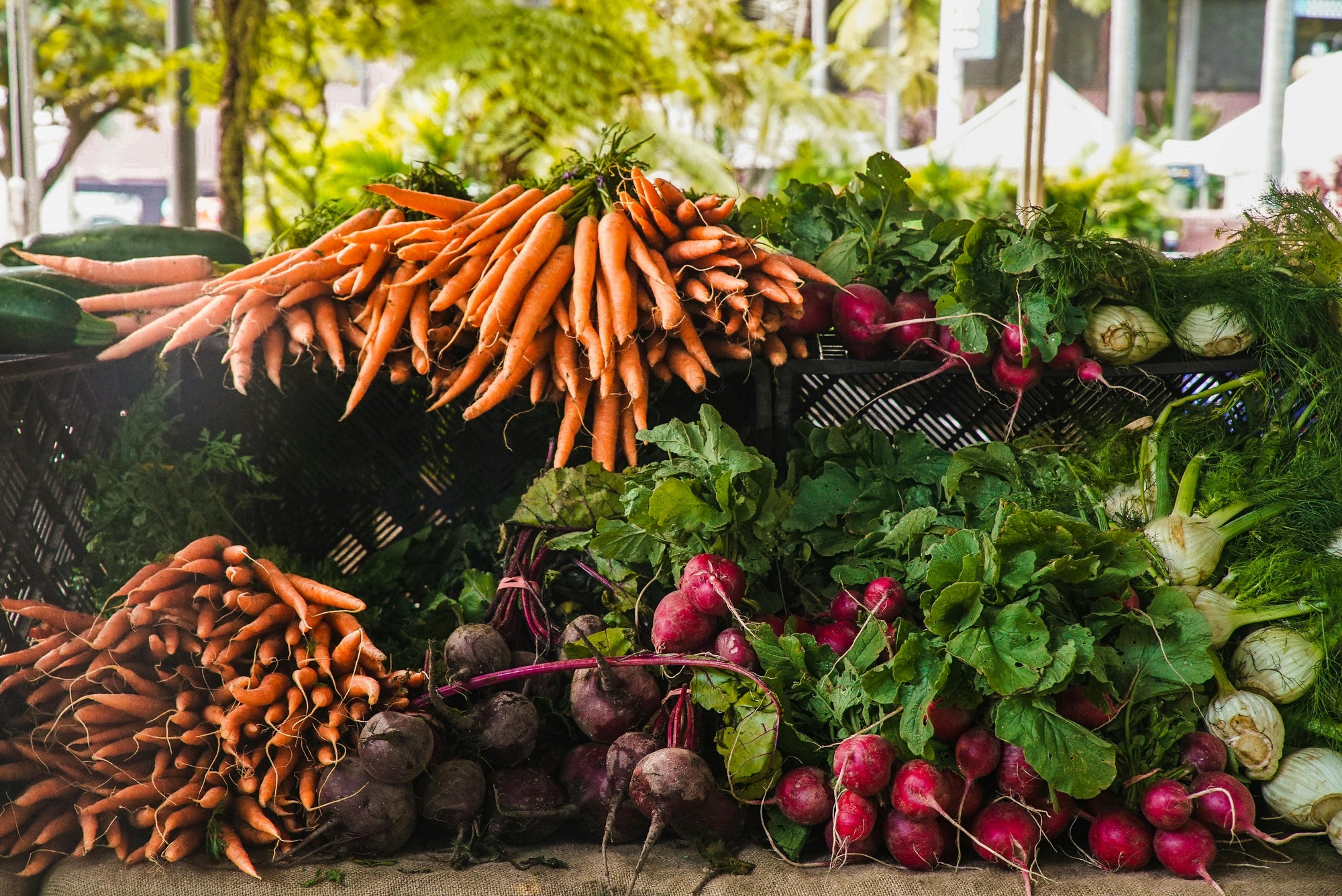
Farmers Market Shopping: Tips for Finding Fresh, Local Produce
Welcome to your comprehensive guide to navigating Australian farmers markets! Whether you're a seasoned market-goer or a curious first-timer, this guide will help you make the most of your local farmers market experience.
Where to Buy: Farmers Markets vs Supermarkets
When it comes to buying fresh produce, Australians have two main options: farmers markets and supermarkets. While both have their place, farmers markets offer unique benefits that can enhance your shopping experience and your meals - and potentially your health.
Farmers markets shine in offering ultra-fresh, locally grown produce. Often, fruits and vegetables are harvested just hours before they reach the market stalls. This freshness not only translates to better flavour but also to higher nutritional value. Plus, you'll find a wider variety of produce, including heirloom varieties rarely seen in supermarkets.
Perhaps most importantly, produce from farmers markets is less likely to be treated with preservatives or coated with waxes. Many people are unaware that supermarket produce is often treated with chemicals to extend shelf life and improve appearance. These treatments might make fruits and vegetables look perfect, but at what cost to our health? Some studies suggest that regular exposure to certain preservatives may have long-term health implications.
Supermarkets do offer convenience and consistency. They're open daily and stock a predictable range of produce year-round. However, this convenience often comes at the cost of freshness, variety, and potentially, purity.
Choosing farmers markets supports local growers and the community economy. It also reduces food miles, making it a more environmentally friendly option. And you can often speak directly with the grower about their farming practices, giving you peace of mind about what you're putting on your family's table.
While supermarkets can be a good backup for staples or when you need produce outside of market hours, for the freshest, potentially safest produce, farmers markets are hard to beat.
Planning Your Market Visit
A successful farmers market trip starts with good planning. Here's how to prepare for a rewarding visit:
- Timing is Everything:
- Arrive early for the best selection, or later for potential discounts.
- Check your local market's operating hours – some are weekly, others monthly.
- Bring Your Own Bags:
- Pack reusable shopping bags or a sturdy basket.
- Consider bringing smaller bags for delicate items like berries.
- Cash is King:
- While some vendors accept cards, cash is often preferred.
- Bring smaller denominations for easier transactions.
- Make a Flexible Shopping List:
- Plan meals, but be open to unexpected finds.
- Check what's in season to guide your list (see our Seasonal Produce Guides below).
- Bring a Cooler:
- For perishables if you're not heading straight home.
- This is especially important in summer.
- Plan Your Route:
- Do a quick lap to survey available produce before buying.
- This helps you compare prices and quality.
By following these tips, you'll be well-prepared for a successful and enjoyable farmers market experience. Remember, part of the joy is in the discovery, so leave some room for spontaneity in your planning!
Questions to Ask Vendors
Engaging with vendors is one of the unique benefits of shopping at farmers markets. Don't be shy – most vendors are passionate about their produce and happy to chat. Here are some key questions to ask:
- "Where is your produce sourced from?" This helps you understand how local the produce really is and can give you insight into the growing conditions.
- "What farming practices do you use?" This can reveal whether the produce is organic, pesticide-free, or grown using sustainable methods.
- "When was this harvested?" Freshness is a major advantage of farmers markets.
- "What's the best way to store this?" Get tips straight from the grower on how to keep your produce fresh for longer.
- "What's coming into season soon?" This can help you plan future visits and meals.
Remember, these conversations aren't just about gathering information – they're about building relationships with the people who grow your food. The more you engage, the more you'll learn about your local food system and the delicious produce you're bringing home.
Tips for Choosing Fresh Produce
Selecting the freshest produce is key to getting the most out of your farmers market visit. While we have detailed guides on choosing specific fruits and vegetables by season, here are some general rules and tips that apply year-round:
- Use All Your Senses:
- Look for vibrant colors and avoid produce with blemishes or bruises.
- Smell the produce, especially fruits – a sweet aroma often indicates ripeness.
- Gently touch to check for firmness where appropriate.
- Weight Matters:
- Choose fruits and vegetables that feel heavy for their size, which often indicates juiciness and freshness.
- Embrace Imperfection:
- Don't shy away from oddly shaped produce. These are often more natural and just as tasty.
- Check for Freshness Indicators:
- For leafy greens, look for crisp leaves without wilting.
- For root vegetables, firmness is key.
- For fruits, a slight give when gently squeezed often indicates ripeness.
- Consider Ripeness:
- Buy some items ripe for immediate use and others less ripe for later in the week.
- Seasonal is Best:
- In-season produce is typically fresher, more flavourful, and more affordable.
- Ask the Vendor:
- When in doubt, ask! Vendors are usually happy to help you select the best items or explain how to tell when something is ripe.
- Trust Your Instincts:
- If something doesn't look fresh to you, it probably isn't. Don't be afraid to pass on an item.
Remember, part of the joy of farmers market shopping is learning about new varieties and how to select them. Don't hesitate to ask questions and experiment with unfamiliar produce.
Building Relationships with Local Growers
One of the unique advantages of shopping at farmers markets is the opportunity to connect directly with the people who grow your food. Building relationships with local growers can enhance your shopping experience, improve your knowledge about food, and even influence what's grown in your community. Here's how to foster these valuable connections:
- Introduce Yourself:
- Take the first step by introducing yourself to vendors.
- Remember their names and use them in future visits.
- Be Consistent:
- Regularity helps build familiarity and trust.
- Show Genuine Interest:
- Ask about their farming practices, challenges, and successes.
- Express interest in the story behind their produce.
- Provide Feedback:
- Let growers know how you enjoyed their produce.
- Constructive feedback can be valuable for farmers.
- Be Patient During Busy Times:
- Understand that some market days are busier than others.
- If it's crowded, keep conversations brief but friendly.
- Support Their Business:
- Take note of any signs around the stalls. Especially social media, delivery and subscription options.
- Learn About Seasonality:
- Understanding what grows when in your area shows growers you're invested in local agriculture.
- Be Open to Suggestions:
- Trust your growers' recommendations for new or unusual produce.
- They might introduce you to your new favorite fruit or vegetable!
- Express Gratitude:
- A simple "thank you" goes a long way in building positive relationships.
By fostering these connections, you're not just buying food – you're becoming an active participant in your local food community. This engagement can lead to a richer, more rewarding farmers market experience and a deeper appreciation for the food on your table.
Maximising Freshness with ReFresh
After selecting the best produce and building relationships with local growers, the next step is ensuring your farmers market haul stays fresh as long as possible. This is where ReFresh comes in – our innovative produce wash spray designed to extend the life of your fruits and vegetables.
Why Use ReFresh:
- Removes pesticides, waxes, and other contaminants more effectively than water alone
- Helps prevent premature spoilage, extending the shelf life of your produce
- Saves water compared to traditional washing methods
- Convenient and easy to use, especially for delicate produce
How to Use ReFresh:
- For any produce that has soil or dirt attached, gently rinse and massage with water.
- Generously spray ReFresh directly onto produce until evenly covered.
- Place produce on a drying rack to remove excess moisture.
- Once dry, store appropriately.
By incorporating ReFresh into your post-market routine, you're not only ensuring cleaner produce but also maximising the lifespan of your farmers market purchases. This means less food waste, more savings and more time to enjoy the delicious, local produce you've carefully selected.
Remember, while ReFresh is excellent for maintaining freshness, proper storage is also crucial.
Seasonal Produce Guides
Understanding what's in season is key to getting the most out of your farmers market visits. Seasonal produce is not only fresher and more flavourful, but it's often more affordable and nutritious. To help you navigate the changing offerings throughout the year, we've prepared detailed guides for both fruits and vegetables:
Seasonal Fruit Guide
Discover the best fruits to enjoy each season, from summer's juicy berries to winter's zesty citrus. Our comprehensive Seasonal Fruit Guide provides insights on selecting, storing, and enjoying fruits at their peak.
Seasonal Vegetable Guide
Learn about the diverse vegetables available throughout the year, from spring's tender asparagus to autumn's hearty squashes. Our in-depth Seasonal Vegetable Guide offers expert advice on choosing and preparing the finest seasonal vegetables.
These guides provide detailed information on what's available each season, how to select the best produce, and tips for storage and use. By referencing these guides, you'll be well-equipped to make the most of your farmers market visits throughout the year.
